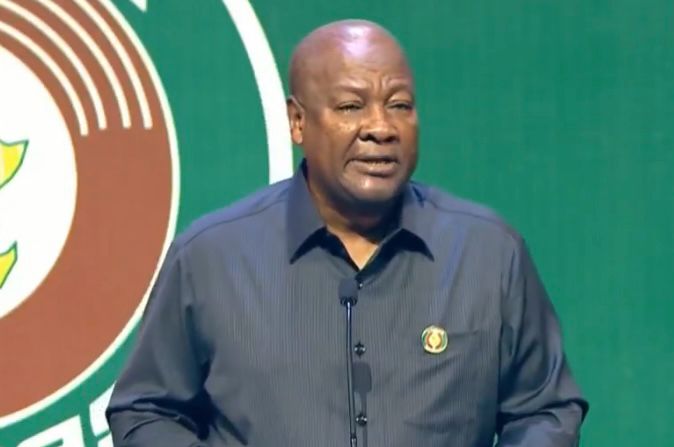John Dramani Mahama, former President of Ghana, delivered a significant address at the 50th-anniversary celebration of the Economic Community of West African States (ECOWAS) held in Accra. His speech emphasized the crucial role ECOWAS must continue to play in promoting peace, stability, and inclusive dialogue within the West African sub-region, particularly in light of recent political upheavals and the emergence of new alliances like the Alliance of Sahel States. Mahama stressed the importance of ECOWAS remaining a platform where all voices, irrespective of social standing, are heard and considered in the pursuit of regional solutions. He advocated for a shift towards visionary, Africa-led initiatives, urging a departure from over-reliance on external influences. Furthermore, he announced Ghana’s commitment to providing 1,000 scholarships for students across West Africa to study in Ghanaian tertiary institutions, a gesture aimed at strengthening regional bonds and fostering collaboration among the youth.
Mahama’s call for an inclusive ECOWAS resonated against the backdrop of recent political turmoil in the region. Coups in Mali, Burkina Faso, and Niger, culminating in the formation of the Alliance of Sahel States, have presented a significant challenge to the authority and effectiveness of ECOWAS. These events underscore the urgent need for a platform where dialogue, peace, and reconciliation can be pursued. Mahama’s emphasis on ECOWAS as a “space for healing” highlights the organization’s potential to bridge divides, address grievances, and facilitate peaceful resolutions to conflicts, thereby preventing further fragmentation and instability within the sub-region. His appeal for “visionary African-led solidarity” underscores the need for ECOWAS to strengthen its role as a driving force for regional integration and development, independent of external pressures.
The former President’s advocacy for Africa-led solutions represents a growing sentiment within the continent for greater self-reliance and ownership of development initiatives. He argued that ECOWAS must prioritize homegrown solutions that are tailored to the specific challenges and opportunities within West Africa, rather than relying heavily on externally imposed models or interventions. This approach recognizes the importance of leveraging local expertise, knowledge, and resources to achieve sustainable development and build resilience within the region. By empowering African nations to take the lead in shaping their own future, ECOWAS can foster a sense of ownership and promote greater effectiveness in addressing regional challenges.
Mahama’s announcement of 1,000 scholarships for West African students reflects Ghana’s commitment to fostering regional integration through education and cultural exchange. This initiative aims to nurture a new generation of West African leaders who are equipped with the knowledge and skills to contribute to the development of their respective countries and the sub-region as a whole. By providing opportunities for students to study in Ghana, the program seeks to build bridges between nations, promote intercultural understanding, and strengthen a sense of shared identity and purpose among the youth of West Africa. This investment in education underscores the belief that fostering collaboration and knowledge-sharing is essential for achieving long-term regional stability and prosperity.
The 50th anniversary of ECOWAS served as a critical juncture for reflection on the organization’s achievements, challenges, and future direction. Mahama’s address provided a timely reminder of the vital role ECOWAS must play in promoting peace, stability, and inclusive development in West Africa. His call for an ECOWAS that listens to all voices, champions Africa-led solutions, and fosters regional integration through education and cultural exchange provides a compelling vision for the organization’s future. The challenges facing the sub-region, including political instability, security threats, and economic disparities, require a strengthened and revitalized ECOWAS that is capable of responding effectively to these complex issues.
Mahama’s speech resonates as a call to action for all stakeholders within ECOWAS – member states, regional institutions, civil society organizations, and the international community – to work together towards a more integrated, peaceful, and prosperous West Africa. The emphasis on fostering dialogue, promoting reconciliation, and investing in human capital development provides a roadmap for building a stronger and more resilient sub-region. By embracing the principles of inclusivity, self-reliance, and regional cooperation, ECOWAS can effectively address the challenges of the 21st century and realize the full potential of West Africa. The 1,000 scholarships symbolize a tangible step towards realizing this vision, investing in the future leaders who will shape the destiny of the region.














